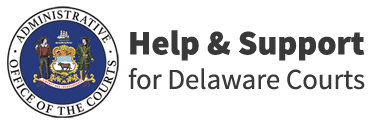Probation Before Judgment in the Justice of the Peace Court Questions and Answers
What is probation before judgment?
Probation before judgment (PBJ) provides a means for a first offender to avoid having a conviction entered against him or her. PBJ works as follows:
- The offender enters a plea of guilty or nolo contendere.
- The Court defers further proceedings and the entry of a judgment of conviction against the offender.
- The Court places the offender on probation for a period of time with such terms and conditions as the Court decides are appropriate.
- If the offender complies with the terms and conditions, at the end of the period of probation, no conviction will be entered on the record.
Am I eligible for probation before judgment?
You may be eligible if you are charged with a violation or misdemeanor offense under Titles 4, 7, 11, or with certain violations or misdemeanors under title 21 (not violations of §§ 2701, 2756, 4103, 4175, 4177, 4201, 4202, or any violation of chapter 67, of Title 21). You are not eligible if your offense falls under the following programs: first offenders domestic violence diversion program (§ 1024 of title 10); conditional discharge for issuing a bad check as a first offense (§ 900A of Title 11); first offenders controlled substances diversion program (§ 4764 of Title 16); or first offenders program for driving while intoxicated (§ 4177B of Title 21).
You are not eligible if you are currently serving a sentence of incarceration, or are on probation, on parole, or on early release of any type imposed for another offense.
You are not eligible if you have entered the PBJ program for any offense within five years of the current offense.
You are not eligible if you have been convicted of certain offenses.
If you are otherwise eligible, you must still have the consent of the State and the Court to your entry into the PBJ program.
What previous convictions make me ineligible for PBJ?
If you are presently charged with a TITLE 11 criminal offense, you are NOT eligible to enter into PBJ for that offense if:
- You have ever been convicted of a violent felony, as defined by 11 Del.C. § 4201(c), or
- You have been convicted of a non-violent felony within ten years of the date of the alleged offense, or
- You have been convicted of a Title 11 misdemeanor offense within five years of the date of the alleged offense.
If you are charged with a violation of Title 21 which is otherwise eligible for PBJ (see above), you are NOT eligible for PBJ if you have been convicted of any Title 21 offense within five years of the date of the alleged offense.
If you are charged with a TITLE 4 offense, you are not eligible for PBJ if you have been convicted of a Title 4 offense within 5 years of the date of the alleged offense.
If you are charged with a TITLE 7 offense, you are not eligible for PBJ if you have been convicted of a Title 7 offense within five years of the date of the alleged offense.
I think I am eligible for PBJ. What should I do?
If you meet all the requirements of PBJ as explained above, you should advise the Court that you wish to enter into the program. THE COURT HAS THE FINAL DECISION CONCERNING ENTRY INTO THE PROBATION BEFORE JUDGMENT PROGRAM. To enter into PBJ, the defendant's case may be scheduled for trial so that the State has the opportunity to consent or oppose the defendant's entry into PBJ. If you are admitted to PBJ, you will be required to sign a Probation Before Judgment Agreement. In signing this agreement, you give consent for the Court to enter a judgment of conviction and sentence against you in your absence, should you fail to provide timely proof that you complied with the terms and conditions of your probation.
What types of terms and conditions will I have to comply with if I am offered PBJ?
All persons entering into PBJ must comply with the following:
- Provide the Court with a current address
- Promptly provide the Court with written notice of a change of address
- Appear at a compliance hearing
Other terms and conditions will depend on the specific case and will be ordered at the judge's discretion. Such terms and conditions may include ordering the defendant to: - Pay a monetary penalty and/or court costs
- Pay restitution
- Perform community service
- Refrain from having contact with certain persons
- Conduct themselves in a specified manner
How long will I be on probation?
The period of probation will be at the discretion of the judge, but cannot exceed the maximum time for commitment provided by law for the specific offense with which you are charged, or one year, whichever is greater.
Will I have to report to a probation officer?
No. Probation under PBJ is handled by the Justice of the Peace Court itself and the terms and conditions are monitored by the Court.
What happens at the end of my probation?
You will be scheduled for a compliance hearing (notice of the time and date of the hearing will be sent to you at the address you have given to the Court). At, or prior to the hearing, you must provide proof that you have complied with any conditions of probation. If you are found to have complied with all conditions, the Court will dismiss the action against you and you will not have a conviction on your record. If the Court finds that you have failed to comply with all conditions, a conviction will be entered against you and you will be sentenced as if you had not been placed on PBJ (except that you will be given credit for any monies already paid to the Court). If you fail to appear at the compliance hearing, a warrant for your arrest for failure to appear will be issued.


